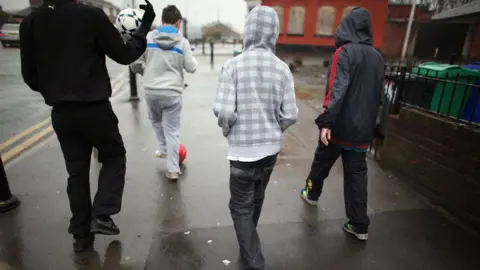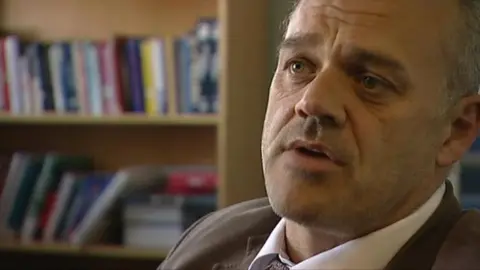Violent crime: Mentoring scheme launches in Wales
 Getty Images
Getty ImagesViolence should be considered contagious - like a disease - according to a global advisor.
Prof Mark Bellis of Public Health Wales said controlling that spread could stop others being infected.
It comes as a new scheme is launched in Cardiff to reduce the number of young people embroiled in serious organised crime and violence associated with it.
Action for Children's mentoring scheme is thought to be one of the first of its kind in the UK.
It uses ex-offenders and drug addicts to help steer others out of a criminal lifestyle.
Prof Bellis, an advisor to the World Health Organization on violence prevention, said getting to young people early was important in order to avoid bigger problems for people around them.
"We know that when people are exposed to violence, even in later life, they're more likely to become violent themselves," he said.
"So in some ways you can almost think of violence as contagious."
He said the problem was increasingly being seen as a public health issue, with education, health and the criminal justice system working together.

"I think Wales is doing some things which could genuinely be described as world-leading," he said.
"You can consider violence to be contagious. Just like a disease - someone being exposed to violence as a child, as an adolescent, or as an adult, are increasingly likely because of that to be involved in further violence themselves.
"And the great thing about that is that when you prevent violence in one little group or one area you prevent it being passed on to another group of people as well.
"So you get the benefits of controlling that violence contagion, not just for the individual who's currently involved in violence but for all the other people that they may have infected."
How will the mentors help?
Action for Children's early intervention scheme has been running in Glasgow since 2013 and has been given £4.6m of the National Lottery Community Fund to be rolled out to Cardiff, Edinburgh and Newcastle.
Brian (not his real name) is one of the peer mentors involved in the project in Glasgow.
Now 37, he first started stealing at the age of eight when parental neglect led him to steal food.
Over the years it spiralled into dozens of prison sentences and drug addiction.
"The young people we're working with are chaotic. They're the ones that are cast aside by society at an early age," he said.
"I just try and steer them on the right path and prevent them feeling the pain I went through - my 17 years of addiction, in and out of prisons - they really don't have to suffer all that."
But he acknowledged it is a different picture facing young people.
"Things have changed for the worse, definitely. These kids are clearly being exploited. And the worst part is that they don't understand that's what's happening to them.
"Some of these kids are taken in and enchanted by it. Making money and having things - but it's all smoke and mirrors."
Analysis suggests out of 49 young people involved in the Glasgow scheme, only four had continued to offend after being involved.
This three-year project for 11 to 18-year-olds in Cardiff will work with police, the council, schools and families to identify vulnerable young people at risk of becoming involved in serious organised crime such as drug-dealing, money laundering and stealing to order.
